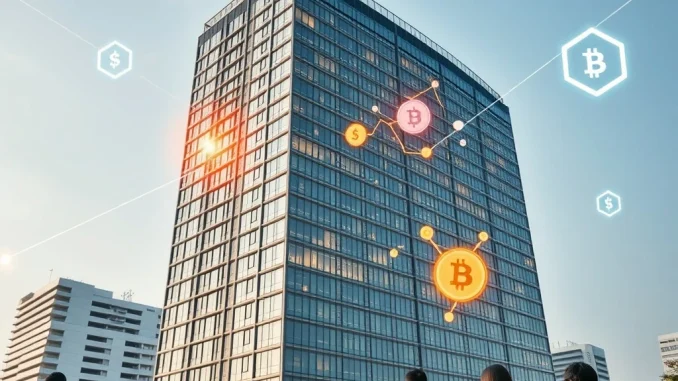
The financial world is witnessing a quiet revolution, and at its forefront is MUFG tokenization. Japan’s largest financial institution, MUFG Bank, is making headlines by leveraging blockchain technology to transform real estate investment. Imagine owning a piece of a prime Osaka high-rise, not through complex traditional means, but through digital securities. This isn’t a futuristic dream; it’s becoming a reality, signaling a significant shift in how we perceive and access valuable assets.
MUFG Tokenization: A New Era for Real Estate Investment
MUFG Bank, through its trust banking arm, Mitsubishi UFJ Trust and Banking Corporation, is pioneering a bold initiative. They plan to acquire a high-rise building in Osaka City for over 100 billion yen (approximately $6.81 billion) and convert it into digital securities. This strategic move aims to open up real estate investment to a broader spectrum of investors.
Initially, these MUFG tokenization efforts will target institutional investors via a private real estate investment trust (REIT) structure. This allows major players like life insurance companies to easily participate in large-scale real estate projects. The integration of blockchain is set to streamline traditional, often cumbersome, investment processes.
Democratizing Access with Fractional Ownership
A key aspect of this initiative is the partnership with Progmat, a leading blockchain-based asset platform. This collaboration extends beyond institutional investors, aiming to offer fractional ownership of foreign real estate properties to retail investors. What does this mean for you?
- Lower Entry Barriers: Instead of needing millions, retail investors can buy smaller, affordable digital units of a property.
- Increased Accessibility: Investment opportunities previously reserved for the wealthy become available to a wider audience.
- Global Reach: The focus on foreign real estate allows Japanese retail investors to diversify their portfolios internationally.
Progmat’s platform will facilitate this, simplifying compliance, settlement, and ownership verification, making the entire process more efficient and transparent.
The Power of Tokenized Assets: Beyond Traditional Barriers
The move to create tokenized assets addresses several pain points in traditional real estate investment. These digital securities offer:
- Enhanced Liquidity: Unlike physical real estate, which can take months to sell, tokenized units can be traded much more quickly on digital platforms.
- Reduced Transaction Costs: By automating many processes through blockchain, intermediaries and associated fees can be minimized.
- Greater Transparency: Every transaction is recorded on an immutable ledger, providing clear and verifiable ownership records.
- 24/7 Trading Capabilities: Digital assets aren’t bound by traditional banking hours, potentially allowing for continuous trading.
This shift reflects a growing global interest in tokenization as a powerful tool to enhance market liquidity and democratize access to previously illiquid or exclusive markets.
Blockchain Real Estate: Streamlining Processes and Enhancing Liquidity
The adoption of blockchain real estate solutions by a major financial institution like MUFG underscores the technology’s maturity and potential. Blockchain acts as the backbone for this new investment model, ensuring the integrity and efficiency of the system.
- Smart Contracts: Automated agreements handle aspects like dividend distribution, ownership transfer, and compliance checks.
- Immutable Records: The distributed ledger ensures that ownership and transaction history are tamper-proof.
- Cross-Border Facilitation: Blockchain simplifies the complexities of international real estate transactions, making it easier to manage regulatory differences and currency exchanges.
Industry experts, including analyst Dr. Jamal Oudeen, emphasize this transformative potential. He noted, “This could reshape how assets are traded, particularly for retail investors who previously faced high minimum investments or lack of liquidity.”
Challenges and the Future of Real Estate Tokenization
While the promise of real estate tokenization is immense, challenges remain. Market acceptance, especially among traditional investors, will be crucial. Regulatory scrutiny is another significant hurdle, as governments work to establish clear frameworks for digital assets. Technological scalability also needs continuous development to handle large volumes of transactions seamlessly.
Despite these challenges, MUFG’s venture is expected to inspire other Japanese banks to explore similar offerings, accelerating blockchain adoption in traditional financial services. This initiative aligns with MUFG’s broader digital transformation strategy, which includes investments in AI, cloud infrastructure, and decentralized finance (DeFi) solutions. This latest step could solidify its leadership in Japan’s real-world assets (RWAs) market, paving the way for a more accessible and efficient global real estate investment landscape.
MUFG Bank’s ambitious move to tokenize real estate, partnering with Progmat, marks a pivotal moment for the financial industry. By bridging traditional finance with cutting-edge blockchain technology, they are not only creating new investment avenues for both institutional and retail investors but also setting a precedent for how real-world assets can be digitized, democratized, and traded globally. This initiative promises to unlock unprecedented liquidity and access, redefining the future of real estate investment.
Frequently Asked Questions (FAQs)
What is real estate tokenization?
Real estate tokenization is the process of converting ownership rights of a physical property into digital tokens on a blockchain. Each token represents a fractional share of the property, making it divisible and tradable like other digital assets.
How does MUFG Bank’s initiative benefit investors?
For institutional investors, it offers a streamlined way to invest in large real estate assets through a private REIT structure. For retail investors, it provides opportunities for fractional ownership in foreign real estate, lowering entry barriers and increasing accessibility to global property markets.
What is Progmat’s role in this partnership?
Progmat is a blockchain-based asset platform that will serve as the underlying technology for structuring and distributing the tokenized assets. It helps streamline processes such as compliance, settlement, and ownership verification, making transactions more efficient.
What are the main advantages of tokenized real estate over traditional methods?
Key advantages include enhanced liquidity (easier and faster trading), lower transaction costs, greater transparency through immutable blockchain records, and the potential for 24/7 trading capabilities. It also democratizes access by enabling fractional ownership.
Are there any challenges to real estate tokenization?
Yes, challenges include achieving widespread market acceptance, navigating complex and evolving regulatory landscapes, and ensuring the technological scalability of blockchain platforms to handle large transaction volumes.
How does this align with MUFG’s broader strategy?
This initiative is part of MUFG’s larger digital transformation strategy, which involves adopting fintech innovations, including investments in AI, cloud infrastructure, and decentralized finance (DeFi) solutions. It aims to cement their leadership in Japan’s real-world assets (RWAs) market.



